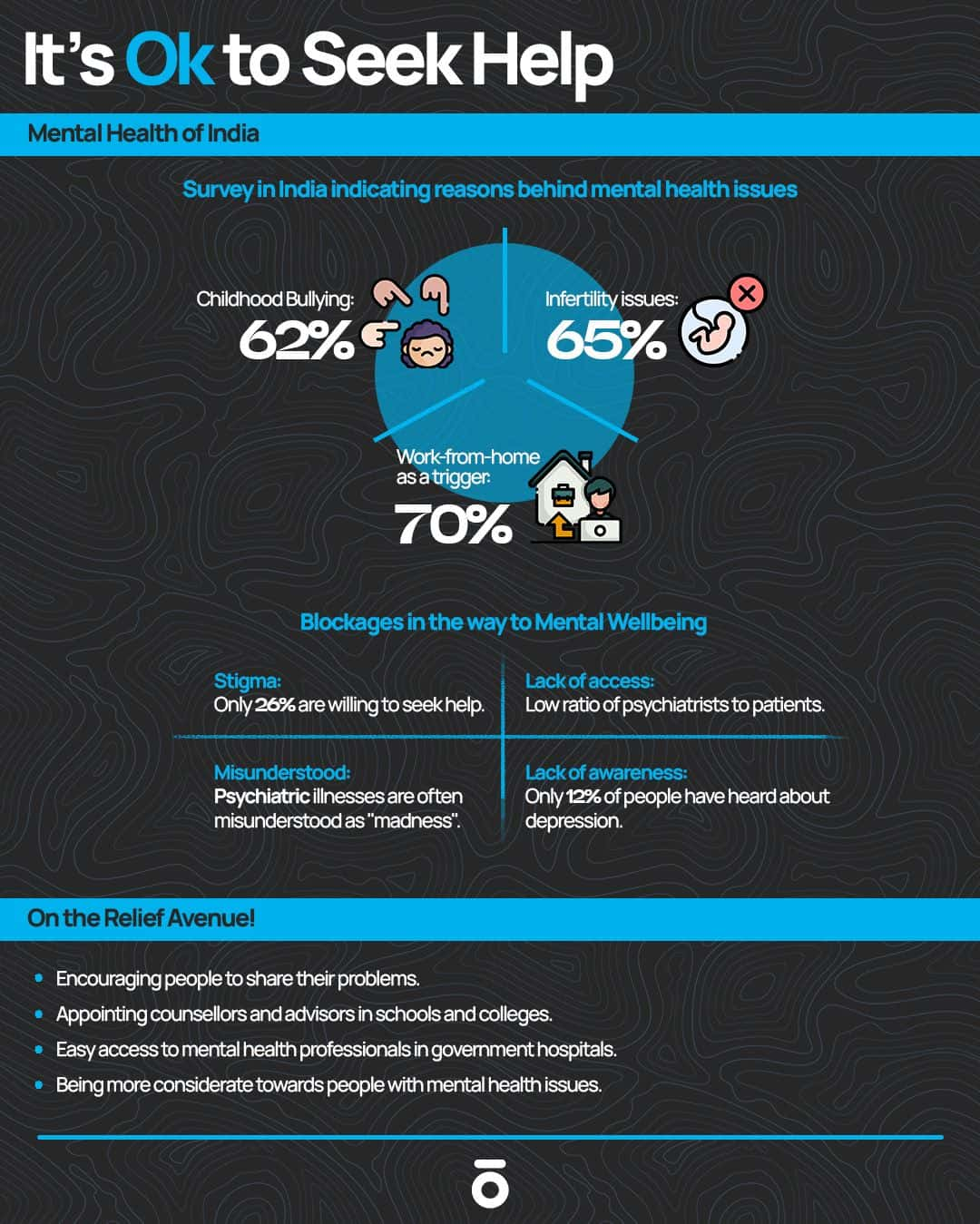Types of Therapy for Mental Health Conditions

Introduction
How therapy is regarded now has become increasingly positive and safer than it has ever been. The stigma attached to it has well and truly kept anyone from seeing it as a progressive step for many years. It has grown so much that there are different types of therapy for other mental health issues.
Scientists have studied tirelessly and found many ways to help each person on this planet, and they are still doing so to this day. Medicine has also come a long way in ensuring the safety and longevity of the patient rather than a quick or miracle fix. This change came after the underlying idea that mental health is more terminal than anyone thought it to be. They can be managed, and a fulfilling life is possible with great effort and the right help.
Learning about this phenomenal change is what today's blog is all about.
Counselling vs. Therapy: A Subtle Difference
Among the number of mental health treatment options, it's essential to figure out whether you need them. While often used interchangeably, counselling and therapy have distinct nuances. Wanting to see the counsellor almost always meant a free period of just chatting with a person who, on some level, knows you're here only to cut classes. So, most times, counselling at the elementary level is someone who can guide and support you during different transitions in your life. Like puberty, for example.
Therapy, on the other hand, delves deeper into your psyche, figuring out the underlying patterns and beliefs that may be contributing to your long-term and short-term struggles. Think of counselling as a quick fix for a minor issue and therapy as a comprehensive overhaul for a major problem. Counsellors focus on your immediate environmental or personal changes to assess your state of mind, while therapists consider your life experiences to tackle a behavioural pattern.
Different Types of Therapy
As we said, there have been great improvements in the field of medicine, especially in the past few decades. We've gone from the inhumane practices that ostracised patients to more consistent and long-term mental health treatment options. Some of these are:
Cognitive Behavioural Therapy (CBT)
Understanding that a certain way of thinking leads to repetitive destructive actions is the first step of CBT. It requires guidance, but it's mostly a path the patients must travel alone. They meticulously monitor their thoughts and actions with trusted help from friends, family or therapists.
Cognitive Behavioural Therapy helps them identify and weed out negative thought patterns, replacing them with healthier, more realistic ones. By challenging distorted thinking and developing coping strategies, CBT empowers you to take control of your emotions and behaviours.
With around 50.4% of a study group seeing positive change after CBT, it's one of the more popular choices and is recommended to most who deal with self-destructive behavioural patterns.
Psychotherapy
Psychotherapy, often referred to as "talk therapy," involves regular sessions with a therapist to discuss your thoughts, feelings, and experiences. It's like having a trusted friend who listens without judgment and offers insightful outside perspectives. Psychotherapy can help you gain self-awareness, improve relationships, and develop healthier coping mechanisms.
Most of all, talk therapy, through its seemingly simplistic nature, has helped a lot in reducing the stigma associated with mental health treatments in general. An NHS study determined a 21.5% rise in people going for talk therapists.
Dialectical Behaviour Therapy (DBT)
DBT is a form of therapy that focuses on mindfulness, distress tolerance, emotion regulation, and interpersonal effectiveness. What it really means is that it is very effective among people who have the tendency to self-harm.
As well as those who struggle with intense emotions and impulsive behaviours. Dialectical behaviour therapy teaches you to accept sudden changes better and helps centre you as life goes on. It is a great boon for people who suffer from Bipolar disorder (BPD) and Substance abuse disorders (SUDs).

Therapeutic Approaches for Anxiety
With the significant three types of therapy out of the way, there are many others that focus on one or two related issues. Anxiety, for example, can be managed better with three effective techniques:
-
Exposure Therapy: Gradually facing your fears in a safe and controlled environment.
-
Cognitive Processing Therapy (CPT): Identifying and challenging negative thoughts related to traumatic events. It is much CBT but is more trauma-focused
-
Mindfulness-Based Stress Reduction (MBSR): Cultivating present-moment awareness through grounding methods and reducing stress.
These, of course, are not the only three methods, but they're a great start. They are recommended by most therapists to people who suffer from anxiety disorders.
How Therapy Helps Depression
Depression by now has been established as a serious concern, with one in seven Indian youths suffering from it.
Some of the ways it can be managed are:
-
Medication: Working with your doctor to find the proper medication for you. This is accompanied by various physical tests to ensure your medication levels do not hinder your everyday life and function.
-
Psychotherapy: Talk therapy can do wonders for depression as it helps figure out the underlying internal struggle and develop coping strategies for them.
-
Group Therapy: Connecting with others who understand what you're going through can also help a lot.
Around 41% of patients responded better to therapy than usual care. Combining the above treatments with lifestyle changes can help improve your overall life quality, which in turn helps with depression, too.
Trauma-Focused Therapy Techniques
Trauma can leave lasting scars that reflect on your actions and thoughts much later in life. Childhood traumas are said to be one of the most brutal ones that stay throughout your adult life and affect you. And beyond the most obvious ones, anything could be traumatic and leave its mark on you, only to be discovered down the line. Some of the ways that trauma can be identified and managed are:
-
Eye Movement Desensitisation and Reprocessing (EMDR): Processing traumatic memories through eye movements or other bilateral stimulation. It essentially "reprograms" the feelings associated with your traumatic memories into positive ones through rapid eye movement.
-
Prolonged Exposure Therapy (PE): Gradually confronting trauma-related memories and situations. It's a type of behaviour therapy where patients either retell or do activities related to the trauma memories to assimilate them.
Group Therapy And Its Advantages
Community and the individual are so interwoven that it's impossible to think of the well-being of one without the other. Group therapy gives a unique chance to combine the two by connecting the community with the individual, relating their sufferings and reminding them that they're not alone. By participating in group therapy sessions, individuals can benefit from a variety of psychological and social advantages.
One of the primary benefits of group therapy is the sense of belonging and support it provides. By sharing their stories and experiences with others who understand, individuals can be free of feelings of isolation and shame. The internalised stigma of mental health treatment will be the first to leave the room.
The group setting fosters a sense of community and empathy, allowing individuals to learn from each other's coping strategies and perspectives. Of course, this is cultivated by a coordinator who picks the group members in terms of how they can help each other.
Most of all, group therapy can provide a safe space for individuals to explore their thoughts, feelings, and behaviours in a non-judgmental setting. Having this acceptance can go a long way in the healing process. The group dynamic can challenge limiting beliefs, encourage self-reflection, and promote personal growth.

Conclusion
Despite its trial-and-error way of thinking, therapy greatly aids those who need it. In fact, it's especially good because of its trial-and-error nature. Only by learning from our mistakes can we shed the past and look to the future. People with mental health issues find the future to be bleak and not worth the effort. Therapy, if done right, can help them see the virtues and the point of living beyond the scars life has left them with.
Once the idea of asking for help is accepted, the rest follows gradually. In this day and age where therapy can be personalised to the T, it's important that everyone utilise it to make their lives a little better and happier.






